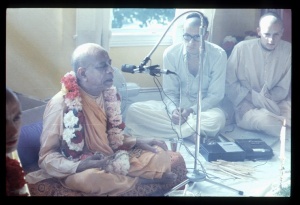SB 6.18.17: Difference between revisions
m (1 revision(s)) |
m (Text replacement - "==== <div class=" to "==== <div class=") |
||
| Line 1: | Line 1: | ||
{{info | {{info | ||
|speaker= | |speaker=Śukadeva Gosvāmī | ||
|listener=King | |listener=King Parīkṣit | ||
}} | }} | ||
[[Category:Srimad-Bhagavatam - Canto 06 Chapter 18]] | |||
[[Category:Bhagavatam Verses Spoken by Sukadeva Gosvami - Vanisource|061817]] | |||
<div style="float:left">'''[[Srimad-Bhagavatam]] - [[SB 6|Sixth Canto]] - [[SB 6.18: Diti Vows to Kill King Indra|Chapter 18: Diti Vows to Kill King Indra]]'''</div> | |||
<div style="float:right">[[File:Go-previous.png|link=SB 6.18.16]] '''[[SB 6.18.16]] - [[SB 6.18.18]]''' [[File:Go-next.png|link=SB 6.18.18]]</div> | |||
{{RandomImage}} | |||
==== TEXT 17 ==== | ==== TEXT 17 ==== | ||
<div class="verse"> | |||
<div | :bāṇa-jyeṣṭhaṁ putra-śatam | ||
bāṇa-jyeṣṭhaṁ putra-śatam | :aśanāyāṁ tato 'bhavat | ||
aśanāyāṁ tato 'bhavat | :tasyānubhāvaṁ suślokyaṁ | ||
tasyānubhāvaṁ suślokyaṁ | :paścād evābhidhāsyate | ||
paścād evābhidhāsyate | |||
</div> | </div> | ||
| Line 17: | Line 22: | ||
==== SYNONYMS ==== | ==== SYNONYMS ==== | ||
<div class="synonyms"> | |||
<div | ''bāṇa-jyeṣṭham''—having Bāṇa as the eldest; ''putra-śatam''—one hundred sons; ''aśanāyām''—through Aśanā; ''tataḥ''—from him; ''abhavat''—there were; ''tasya''—his; ''anubhāvam''—character; ''su-ślokyam''—laudable; ''paścāt''—later; ''eva''—certainly; ''abhidhāsyate''—will be described. | ||
bāṇa- | |||
</div> | </div> | ||
| Line 25: | Line 29: | ||
==== TRANSLATION ==== | ==== TRANSLATION ==== | ||
<div class="translation"> | |||
<div | |||
Thereafter, Bali Mahārāja begot one hundred sons in the womb of Aśanā. Of these one hundred sons, King Bāṇa was the eldest. The activities of Bali Mahārāja, which are very laudable, will be described later [in the Eighth Canto]. | Thereafter, Bali Mahārāja begot one hundred sons in the womb of Aśanā. Of these one hundred sons, King Bāṇa was the eldest. The activities of Bali Mahārāja, which are very laudable, will be described later [in the Eighth Canto]. | ||
</div> | </div> | ||
__NOTOC__ | |||
<div style="float:right; clear:both;">[[File:Go-previous.png|link=SB 6.18.16]] '''[[SB 6.18.16]] - [[SB 6.18.18]]''' [[File:Go-next.png|link=SB 6.18.18]]</div> | |||
__NOTOC__ | |||
__NOEDITSECTION__ | |||
Revision as of 15:35, 14 November 2018

His Divine Grace
A.C. Bhaktivedanta Swami Prabhupada
A.C. Bhaktivedanta Swami Prabhupada
TEXT 17
- bāṇa-jyeṣṭhaṁ putra-śatam
- aśanāyāṁ tato 'bhavat
- tasyānubhāvaṁ suślokyaṁ
- paścād evābhidhāsyate
SYNONYMS
bāṇa-jyeṣṭham—having Bāṇa as the eldest; putra-śatam—one hundred sons; aśanāyām—through Aśanā; tataḥ—from him; abhavat—there were; tasya—his; anubhāvam—character; su-ślokyam—laudable; paścāt—later; eva—certainly; abhidhāsyate—will be described.
TRANSLATION
Thereafter, Bali Mahārāja begot one hundred sons in the womb of Aśanā. Of these one hundred sons, King Bāṇa was the eldest. The activities of Bali Mahārāja, which are very laudable, will be described later [in the Eighth Canto].